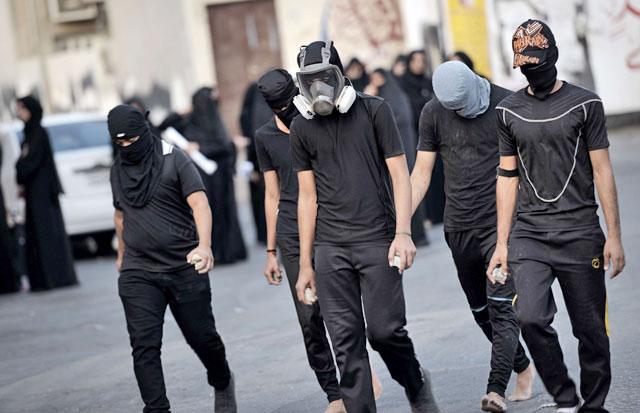You are here
Controversy clouds first Bahrain vote since uprising
By AFP - Nov 23,2014 - Last updated at Nov 23,2014
MANAMA — Controversy clouded Sunday Bahrain's first election since Sunni authorities crushed protests led by the Gulf monarchy's Shiite majority, with the opposition mocking government boasts of more than 50 per cent turnout.
The focus was on turnout, a key marker of the poll's validity after an opposition boycott, and the count was still under way after Saturday's election to a 40-member parliament.
The official electoral commission put turnout at 51.5 per cent, but the Shiite opposition, which has dismissed the polls as a "farce", said only 30 per cent of eligible voters had cast their ballot.
Both sides also traded accusations of electoral malpractice, with the opposition saying tens of thousands of people were pressured to vote, while the Sunni authorities accused Shiite militants of preventing others from reaching polling stations.
"Lying, insults and ridicule are the weapon of the defeated," wrote Information Minister Sameera Rajab on her Twitter account, retaliating to claims of vote rigging.
The legislative polls were the first since security forces in the Sunni Muslim-ruled kingdom crushed Arab Spring-inspired protests led by the majority Shiites in 2011.
The tiny Gulf state and key US ally remains divided nearly four years after the protests.
"It was an astonishing turnout. It was unprecedented," wrote columnist Hisham Al Zayani in Al Watan daily, insisting the fraud claim was the result of a failed boycott.
Al Wefaq, the main Shiite opposition group which withdrew its 18 lawmakers after the crackdown, warned Friday that failure by the ruling Al Khalifa dynasty to ease the Sunni "monopoly" on power could trigger a surge in violence.
'End to confessionalism'
Voting closed at 1900 GMT Saturday after a two-hour extension decided by the electoral commission, in a likely bid to boost turnout amid reports that many Shiites had heeded the boycott call.
An hour later the commission's head, Sheikh Khaled Al Khalifa, who is also justice minister, said initial estimates showed 51.5 per cent of registered voters turned out to vote.
The high turnout "puts an end to confessionalism in Bahrain", he said in reference to the opposition's boycott call.
Almost 350,000 Bahrainis had been called to elect the lower house of parliament, with most of the 266 candidates Sunnis.
Al Wefaq dismissed the official turnout figure as "amusing, ridiculous, hardly credible".
Government officials were "trying to fool public opinion and ignore the large election boycott by announcing exaggerated figures", the opposition group said in a statement early Sunday.
The Shiite opposition instead cited a turnout figure of "around 30 per cent", allowing a possible 5 per cent difference either way.
It also accused the authorities of forcing tens of thousands of state employees and others to vote or face consequences.
Government officials, for their part, accused Shiite militants of provoking incidents which blocked roads in Shiite areas of the capital Manama to prevent people from voting.
Security forces fired tear gas to disperse the demonstrators, some them masked and armed with petrol bombs, in Shiite villages on Saturday.
'National dialogue' fell apart
The political rivals have struggled to bury their differences through a so-called "national dialogue" that fell apart despite several rounds of negotiations.
Al Wefaq chief Sheikh Ali Salman said the lack of accord could lead to an "explosion" of unrest in Bahrain, home to the US Navy's Fifth Fleet and a partner in the US-led campaign against the IS in Syria and Iraq.
The boycott stems from "the people's demand for democratic reforms", Salman told AFP.
The opposition wants a "real" constitutional monarchy with an elected prime minister independent from the Al Khalifa royal family — a demand rejected by the Sunni dynasty.
In October, a court banned Al Wefaq for three months for violating a law on associations.
The movement refused to resume talks with the authorities in September despite a new proposal announced by Crown Prince Salman Bin Hamad Al Khalifa.
Authorities ignored pleas by human rights groups last year to release political prisoners, instead increasing the punishment for violent crimes.
At least 89 people are estimated to have been killed in clashes with security forces and hundreds arrested and tried since the uprising began in February 2011.
Local municipal elections were also held on Saturday.
Related Articles
Bahrainis voted in the second round of a parliamentary election on Saturday, a poll boycotted by the tiny Gulf monarchy's Shiite-led opposition which accuses the government of gerrymandering and says parliament lacks powers.
Bahrain went to the polls Saturday for its first legislative elections since a failed pro-democracy uprising in 2011, with the opposition boycotting the vote in the tiny Gulf monarchy.
Four opposition groups including the largest, Al Wefaq, will boycott a parliamentary election scheduled for November in Bahrain to protest what they described as a vote where the results would be "fully controlled by the ruling authority".












